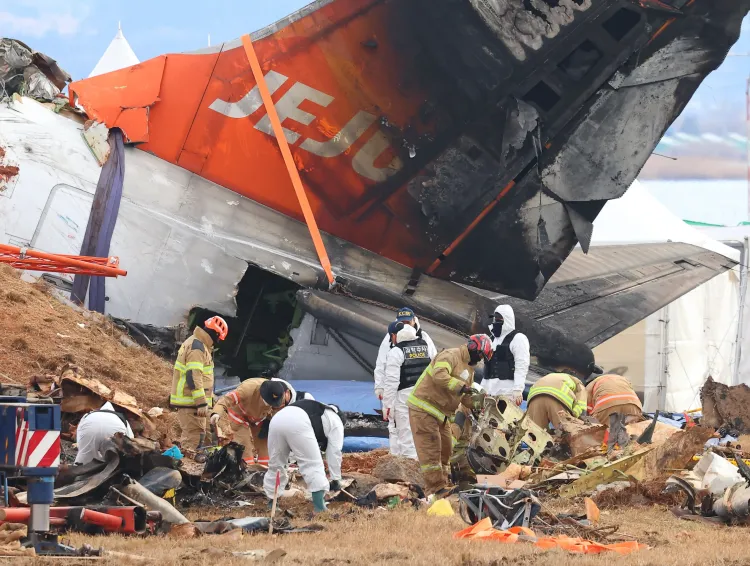Jeju Air Flight Received Bird Strike Alert Just Before Black Box Failed

Synopsis
Key Takeaways
- Jeju Air flight received a bird strike warning shortly before its black box stopped.
- The crash resulted in 179 fatalities and 2 survivors.
- Preliminary report to be sent to international aviation organizations.
- Surveillance footage confirmed a go-around attempt before the crash.
- Investigation will take several months for thorough analysis.
Seoul, Jan 25 (NationPress) The unfortunate Jeju Air flight involved in last month's tragic incident received a notification from air traffic control about bird activity merely one minute prior to the cessation of its black box recording, the transport ministry reported on Saturday.
The ministry provided preliminary insights to the grieving families following its investigation into the lethal incident of the low-cost airline flight from Bangkok, which resulted in the deaths of 179 individuals on board and left only two survivors, in South Korea's southwestern city of Muan on December 29 of the previous year.
The government is set to unveil the preliminary report by Monday, which will be forwarded to the International Civil Aviation Organization, along with the United States, France, and Thailand, as stated by the ministry, according to Yonhap news agency.
The investigation committee under the ministry revealed that surveillance footage from the accident moment at Muan International Airport confirmed that the aircraft attempted a go-around just before colliding with a flock of birds.
The aircraft first communicated with the air traffic control tower at 8:54:43 a.m. as it was approaching for landing. The control tower authorized it to land on Runway 01, which faced the opposite direction of the runway where the incident occurred.
At 8:57:50 a.m., the control tower alerted the aircraft about a possible bird strike. At 8:58:11 a.m., the captain and first officer discussed a flock of birds flying beneath the airplane.
The recording seemingly ceased at 8:58:50 a.m., indicating that the aircraft likely lost power after both engines were disabled due to the bird strikes.
Feathers and blood, likely from a type of winter migratory ducks, were discovered on both engines, the ministry stated.
The pilot reportedly issued a mayday distress call at 8:58:56 a.m., though this is an estimation derived from synchronization with the control tower records, as no recording of it exists in the black box, according to the ministry.
The airplane traveled for around four minutes before landing from the opposite direction without deploying the landing gear. It collided with a concrete localizer mound and erupted in flames at 9:02:57 a.m.
The ministry indicated that the analysis of flight data and cockpit voice recordings for verification will require several months.
Meanwhile, the group representing the victims' families has decided to cease the search for victims' remains at the crash site.
Authorities have sent the remains found at the site to the national forensics institute for identification.









